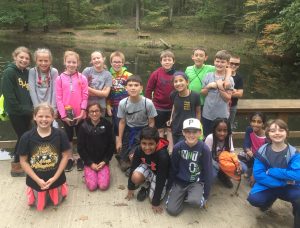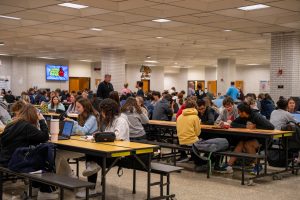The Spirit of Education
After witnessing the struggles of learning for immigrants, NASH senior Noor Ahmed crafted a plan to revolutionize education.
September 13, 2022
What are you most excited about for senior year?
I’m most excited for the end-of-the-year activities like Prom, Senior Banquet, and, of course, graduation. These are things I’ve been looking forward to ever since high school started, so it’s hard to believe I’m in that position now as a senior. I’m really excited for that feeling of accomplishment when it’s all over.
What colleges are you applying to?
I really love medicine, so I’m focusing on colleges with strong and world-renowned programs, such as the University of Pittsburgh, which is one of my top choices with its highly-selective medical school. I also like Case Western and the University of West Virginia. I hope to apply to a few Ivy League schools, but that requires a lot more thinking.
In college, what do you plan to major in?
I want to pursue medicine in the future, so I am looking to major in biology or neuroscience. Ever since ninth-grade biology with Dr. Gallo, I’ve always loved biology, compared to all other sciences and subject areas. I also really love psychology, so neuroscience would be a nice way to blend these two interests.
Describe Kefi Refugee, the organization you founded.
Kefi Refugee is a tutoring organization geared specifically towards helping refugees. Many refugees that come to America feel isolated trying to navigate through their new life, especially in the American school system. I always wanted to use my fortune of living in America to help these people achieve the bright futures they’ve wanted for so long. Tutoring resources are often hard for refugees to access, so I focused on making Kefi Refugee adaptable and flexible, taking advantage of technology to teach kids. These kids should be able to learn in ways that make them most comfortable, so Kefi Refugee encourages a collaborative learning environment, allowing students to form positive associations with learning and curiosity.
What empowered you to start Kefi Refugee?
Earlier this year, I found out about an event with new Afghan refugees in Pittsburgh. It involved meeting child refugees and playing games with them to try and form emotional connections, despite the language barrier. When I met these kids, they were all very shy at first, sticking to themselves and even hesitating to make eye contact. I knew I had to take a leading role in making the atmosphere more comfortable and welcoming, so I continuously tried to interact with them by playing games. I felt such gratitude from simply being able to connect with these kids, and after hearing about how difficult their transition was into American society, I instantly wanted to do more to help them. Bringing my focus on education, I sought to create a virtual teaching platform where I could spread my knowledge on subjects such as English, science, and math, which propelled Kefi Refugee into action.
What was the process of creating the organization?
The first step for me was to create a website that could bring my idea to life and express my reason for creating such an organization. From there, I contacted the administrators of these kids, sharing the website and my mission of helping them achieve their academic dreams. Despite making the lessons online due to transportation complications, it was still hard to meet virtually with these Afghan refugees as some of them didn’t have access to any technology or Wi-Fi. We tried to eliminate these challenges so the children could quickly start the lessons. After fixing these problems and creating teaching materials, I was finally able to start teaching these refugees.
What is the goal of Kefi Refugee?
Kefi Refugee’s goal is to help students reach their full academic potential in an empathetic and encouraging environment. Kefi Refugee primarily values student growth, where the goal is to simply achieve more than the day before, taking it step by step to build each student’s confidence in their academic abilities. Every student deserves to learn in a welcoming atmosphere where they can have input and flexibility in their learning, crafting their own future in the process.
What qualifies a person to teach at Kefi Refugee?
Teaching at Kefi Refugee isn’t just about knowing English or having experience in the American school system. It’s about having patience and a wholehearted understanding of the struggles many students face–all while maintaining a positive attitude, as we are working with people during sensitive times of their lives. There are many times when I would communicate in a way that the students would not understand, so I would have to rephrase and work hard to make sure everyone has their questions answered adequately. Additionally, I’m not a native English speaker myself, so I remember how it feels very isolating to live in an area where everyone speaks a different language. I seek to mitigate these struggles to ensure students feel as comfortable and cared for as possible.
How has Kefi Refugee changed your outlook on education?
Kefi Refugee showed me that education is a reinforcement process. It’s about being patient with people and encouraging them to continue seeking knowledge. With the competitiveness of today’s society, it’s easy to fall into the trap of just caring about grades and nothing else, but Kefi Refugee helped me retain and spread the belief that pure curiosity and the intrinsic desire to learn more about the world are most important. Now, when I’m in school and feel that I am struggling with a certain class, I am able to still think positively, recognizing my great privilege in having the opportunity to learn such material. Having this mindset really helps mediate my stress as I move forward in my education.
Where did the organization’s name originate?
Kefi means “the spirit of joy” in Greek. It felt fitting since I aim to focus on creating a learning environment that is comfortable overall, not just with the goal of getting a good grade.
What was your most life-altering or thrilling experience when tutoring?
When I first started teaching, one of my students wanted to learn about grammar rules in the English language, a topic she had struggled with previously. After teaching the content to her and practicing, she improved immensely just over the course of one meeting–she was so surprised with herself. The smile on her face after she had mastered this concept is something I will never forget. Even though it was our second meeting together, we already had built a strong relationship with each other through the vehicle of education. This experience demonstrated to me the power of education in connecting people, transcending the language barrier.
How do you believe Kefi Refugee has changed kids’ learning experience?
Speaking with some of the kids I teach, I realized how different Kefi Refugee is from the learning experience that they had in the past. One student in particular told me that their previous education had been unorganized and with teachers that did not even accept questions from students. They would sometimes have to learn just by watching a video and writing some important words down. This helped me realize the importance of engaging students in learning and making sure all of their concerns are accounted for, two ideals necessary for any learning experience. Kefi Refugee offers much more organized and flexible learning, and the results have supported this claim as I see the people I teach learn more concepts and develop a stronger relationship with learning.
Where do you see Kefi Refugee in five years?
In five years, I hope that Kefi Refugee has expanded to support an ever-increasing number of refugees. I hope that this organization can act as a safe space for those that might feel alone or need some guidance academically. I hope to create more resources and opportunities for those that feel disadvantaged in a society that does not cater to their needs and level of comfort.
If you could go back to a certain grade, which one and why?
I would choose to go back to ninth grade. Ninth grade, being the first year of high school, allowed me to feel a sense of flexibility in my learning that I hadn’t felt before. At the same time, there was a balance between learning new material and taking time to rest, since the workload at that point of high school was very manageable. I really enjoyed and continue to enjoy being able to have more responsibility and direction in the way I learn.
If you could have dinner with any person dead or alive, who would it be?
I really love Hanan Al Hroub, a Palestinian teacher who helped children traumatized by violence. She grew up in a violent refugee camp and used her experiences to fuel her passion to help others, which really resonates with me as I try to help students craft the futures they desire for themselves. She really focused on building trust and maintaining cooperation in her practice, which constantly reminds me to always have a good attitude with the people I teach in order to build positive relationships with the pursuit of gaining more knowledge.
If you could have any job in the world, what would it be?
I would choose to be a doctor. As medicine is a field of lifelong learning, I find joy in keeping myself up to date with new developments in this continuously evolving field. Additionally, I want to be the one to care for people when they feel most vulnerable, catering specifically to their needs and desires in the hospital.
Is there something that you’ve dreamed of doing for a long time?
I’ve always dreamed of helping people back in my home country. Being from Iraq, there are many people that don’t even have the basic resources to live comfortably, let alone to have an education. I seek to directly help people from my home country gain the resources they need and the education they desire, standards that everyone deserves.













